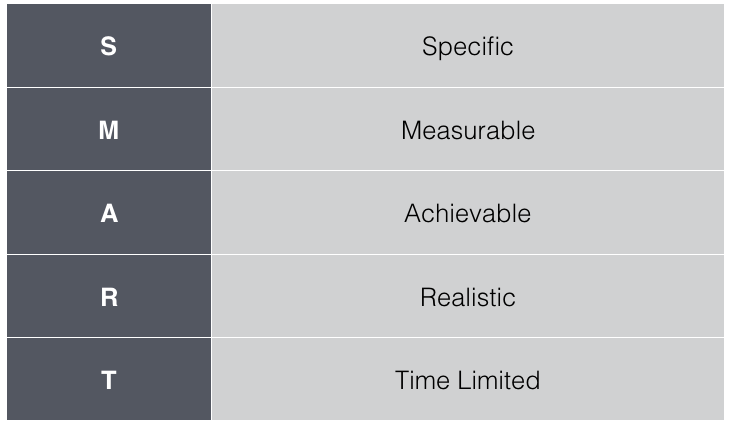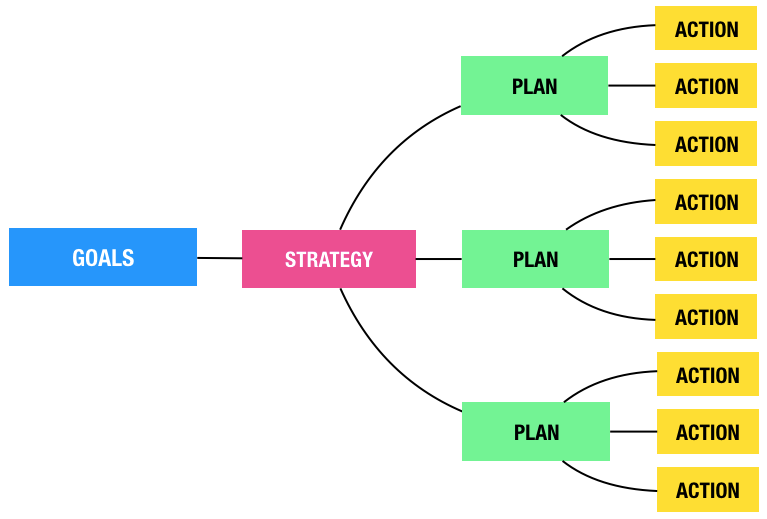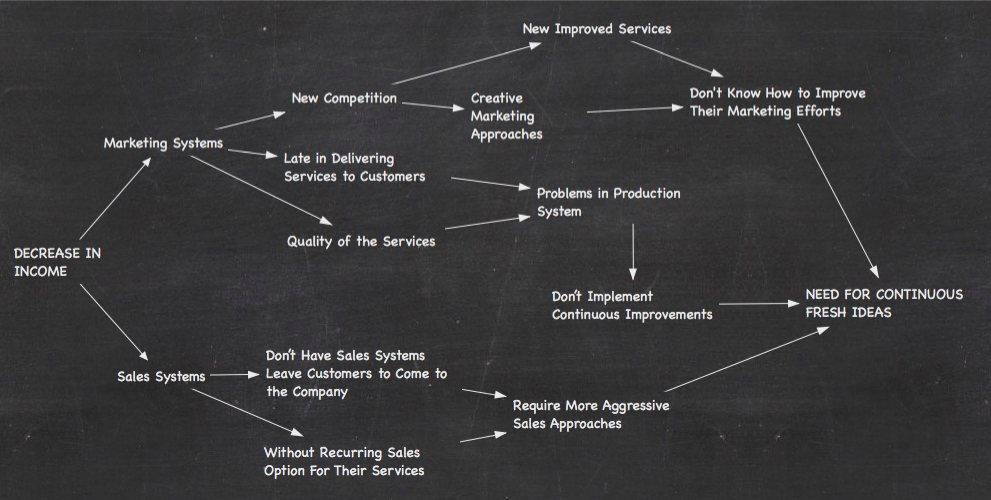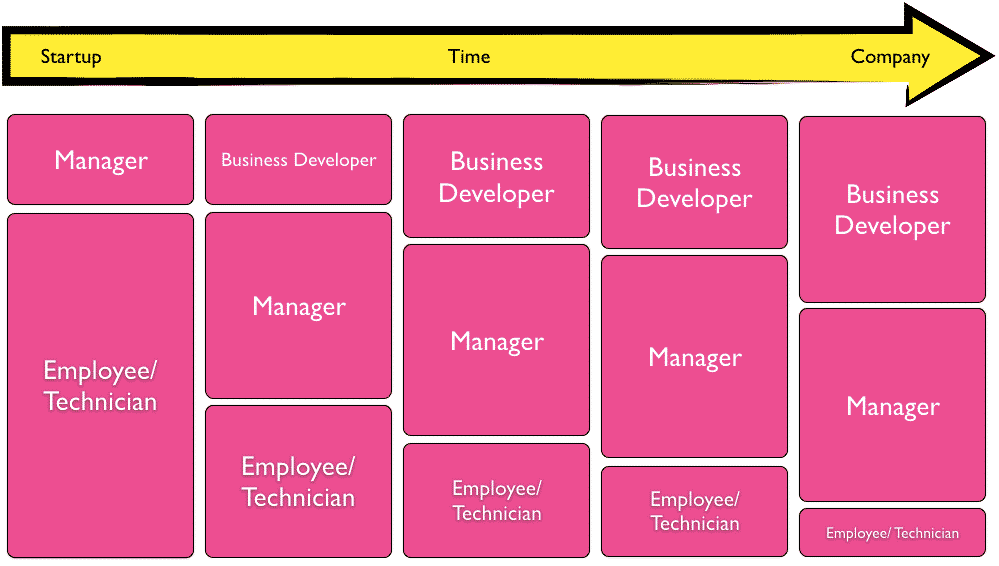As an entrepreneur, you cannot expect that you can build a business if you push yourself to be the only employee in your company. In such a case, you are an entrepreneur, manager, business developer, and employee. Your job as an entrepreneur is to build the business, not the product or the job for yourself. Yes, you are building the product because your company must sell something. But, it is not the one and only task for you. The question is how you can deal with this problem.
There is a difference between job development for yourself and building a real business. With job development around your product, you are a craftsman. Someone who is the only person that can produce a product or service. In such a case, once you stop producing your product, the business will disappear. When you want to retire or sell your business, it will have little value. Such a company, without you, is not a business in the real meaning of the word.
On the other side, when you build a business, your company can survive without your everyday inputs.
So, you will need to build the business, not the product, not the job. Or, better said in the start-up stage of your business, you will need to build the business alongside your product.
Here are seven tips that can help you to build a business.
1. Set up your business goals
Let’s say one of your goals is to expand your business in a new international market. The goals as goals don’t have meaning to you if you don’t put all your efforts into achieving them. So, you will need to take more steps instead of only setting up your goals. You will need to dig deep into what they mean for you and your company.
There are many questions you will need to answer. Where is the best international place to start expansion? What can you do with your current staff? If not, how many people will you need? How much money are you willing and ready to spend on this expansion?
As you can see, setting up goals is the simplest thing you can do, but creating SMART goals is something more difficult.

2. Focus on your business strategy and plans
You need to translate your goals into strategy and plans if you want to achieve them.
Do you know where you want your company to be in two, five, or 10 years? Do you want to take the company public? Maybe you want to sell it in the future.
Now is the right time to look again into your goals and compare them to the answers to these questions. Are there some changes in your goals?
The next thing you will need to do is to make a business plan. The plan will need to answer the following question: what will you need to do to achieve your goals and put in place the strategy?
Break down each of your goals into mini-achievable goals for each month for the next year or years, depending on the timeframe of your goals. Then break those mini-achievable goals into actions that you will need to take each week. When you complete these weekly activities, you will achieve your mini-achievable goals. On the other side, achieving your mini-achievable goals will help you to achieve your primary goals in the long-term.

3. Develop a sustainable business model
Check your business model to see if you need to make some changes related to your goals, strategy, and plan. Can you add extra revenue streams? Can your cash flow support your plans? Do you need to change something in your business model to support the achievement of your goals? Can you allow yourself to employ new employees? Do you need to change something in your business model to allow growing human resources?
You will need to answer these and many other questions.
4. Do only things that you can do extraordinarily well.
You can not be everything to everyone. You will need to focus on the most important things that you are doing well. Something that only you can do and nobody else. These are those things that will make your business different from your competition in the market.
5. Build a strong team on which you can depend
If you want to build a sustainable business, you need to produce your service or product in the most efficient way. Additionally, you will need to market and sell them. Remember that you are not the only marketer and seller of your products. You will also need other people as a part of your business team. Honestly, you don’t want only you to be the business. Your team members and your systems are presenting your business, not you.
Once you’ve hired employees to do some of your business tasks, you need to let them do the tasks. I have seen many entrepreneurs that, even if they build their teams, still want to do all the tasks. It’s not something that means building the business. You need to give them the freedom to do the tasks for which you hire them. It doesn’t matter if this is some part of your product design process, production, writing your business blog, or maintaining your website. Just allow them to do their job.
6. Build your business systems to build the business
Having a business means that everyone in the company will know when and how to do important things for your business.
Your business systems and processes will be the essential building blocks of your business. Everything will depend on them, with or without your presence in your company.
Can you imagine a company without systems? I can because I have seen many of them. They have a strategy and plans, but nothing is accomplished or is accomplished later than expected. The quality of the results of each work is on a very low level. Customers complain. Employees complain. Managers complain. If I want to describe such a business with one word, it is chaos.
Here you can find some sources that can help you in the development of your most important systems and processes:
- Step-by-step guide: how to build valuable systems easy
- Business system – how to install it in business?
- The standard operating procedure as the basis to standardize processes

7. Be aware that your roles in your business will change over time if you really want to build the business
Your roles in your own business will evolve, and you need to be aware of and prepared for this. The role change will come faster than you expect.
Most companies succeed in passing the startup stage, but in most cases, their owners do not succeed in passing this stage. In such a case, they are trying to maintain their business to its original position (startup stage). Because of that, they feel the pressure to work harder for less money.
Your roles as an employee or technician in your company will become less important for your business development as time passes. Over time, you need to focus more on the management role and business development role. So, you will need to change as your business continues on the development journey. See how your roles will need to evolve.






